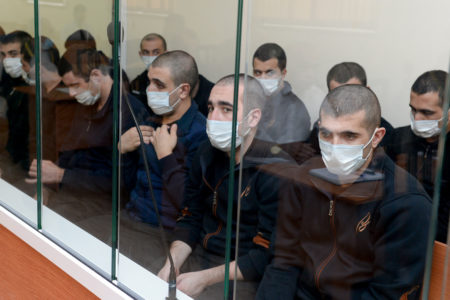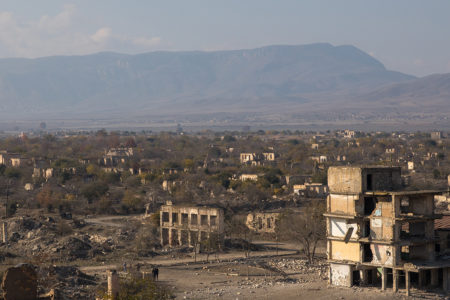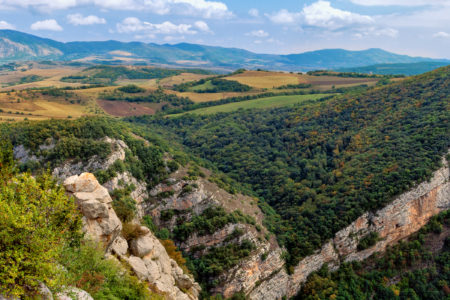
On the morning of April 23, I learned that Boris Yeltsin had died. Memories surged of the four intense and dramatic years my wife and I had spent in Moscow during Boris Nikolayevich’s first term as president of the newly created Russian Federation, when we lived out a narrative of good guys and bad guys, with enormous and historic stakes in play. It was a time when the human spirit lifted and fell and lifted again, a chaotic, cruel time for many as the totalitarian world was turned upside down.
Boris Nikolayevich had done very great things. He believed in three simple and powerful rights: to a demo- cratic vote, to free speech and to own property, all illegal and judged seditious under Communism. He ended the Communist Party, the Soviet Union and the Cold War. In the long view of history, these will be seen as huge achievements.
It is commonplace now to blame him for the inequities and damage to the social fabric caused by privatization, but less often remembered is that ”œshock therapy” was the pre- scription foisted on Russia’s young and inexperienced econo- mists by the West, in the persons of the well-paid bureaucrats of the International Monetary Fund and the World Bank and especially by self-interested and conflicted experts of the Harvard Institute for International Development.
True, Boris Nikolayevich behaved and governed in ways which stood on their head the sober Canadian governance themes of ”œpeace, order, and good government.” His appallingly ill-managed military campaign to suppress Chechen separa- tion was disgraceful. But he changed Russia fundamentally, and in doing so, he changed the world for us all.
Trying to put my thoughts, memories and emotions in order to write about Yeltsin, I sought the companionship and inspiration of music. Our profound feelings of affection for Russia, especially its ”œsoulful” side, draw again and again from its deep well of music and literature whose beauty, compassion and intelligence make reading and knowing of the appalling cruelties of Russian history in the 20th centu- ry somehow endurable.
My mental scan for the Russian who could speak to me best about Boris Yeltsin focused immediately on Mstislav Rostropovich. It was Rostropovich’s connection to Yeltsin, in the decisive moment for him and for Russia, which I felt most that morning.
I instinctively reached for the cellist’s recordings of Shostakovich, but broke instead to the Dvorak Cello Concerto. Why the Dvorak? Because Rostropovich had told my wife, Hana, that this 1952 Prague recording, performed under the direction of her own grandfather, the legendary maestro Vaclav Talich, for decades the conductor and musi- cal director of the Czech Philharmonic, was the first he ever made. That tenuous family connection also explains how I came to meet Rostropovich, whose fondness for Talich ”” an artist who also suffered greatly under a Communist regime ”” extended instinctively to his grand- daughter, and hence his circle of light had indirectly shone on me too.
Four days later, Mstislav Rostropovich himself died in Moscow. Like Yeltsin’s, his body lay in state, in his case in the Moscow Conservatory whose ethos and histo- ry are as sacred to music as the recon- structed Church of Christ the Saviour is to the resurrected Russian Orthodox Church, in which both men had their funerals four days apart, before being buried in Novodevichy Cemetery. Yeltsin was the first Russian leader to have had a church funeral since Emperor Alexander III in 1894.
A vast circle around Russia’s disas- trous 20th century has, we hope, been closed by Yeltsin and Rostropovich ”” two giants of Russia whose back- grounds seemed polar opposites.
Yeltsin was a rough, sports-loving construction engineer who became a local party boss by virtue of his energy and aptitude for getting things done. Though a member of the Communist Party until he very publicly quit in 1990, he was a contrarian, a rebel. His autobiography, written in 1999, is aptly called Against the Grain. Under Stalin, he would have suffered much more than his father, who was sent to a gulag for four years in 1934 for anti- Soviet behaviour; Boris Nikolayevich would have been eliminated.
But he advanced through the party ranks and became in the 1980s the populist and popular boss of Moscow (who like today’s New York City mayor, Michael Bloomberg, rode a streetcar to work) and challenged the leadership to reform ever faster. Eventually, his compulsion to ques- tion higher authority, and specifically the interference of Raisa Gorbachev in policy decisions, led to his dismissal and a campaign of vilification from the Kremlin.
But after a few years of relative oblivion, his decisive moment would come, to be shared with Mstislav Rostropovich.
Only three years older than Boris Nikolayevich, born in 1927, Rostropovich had a much more rari- fied childhood and family. He was from Baku, in oil-rich Azerbaijan, the gifted son of musical parents whose origins were as cosmopolitan as their Caucasian community, though the Bolshevik revolution had by then chased away the millionaires.
He entered the Moscow Conservatory at 16 in 1943, and stud- ied under Prokofiev, who had returned from America, and the great and polit- ically ambiguous Shostakovich.
Rostropovich’s gigantic talent was immediately clear to all, and overrode the risks he took because of his strength of character, shown when he quit the Conservatory in 1948 on learning that Shostakovich had been dismissed for arousing Stalin’s dis- pleasure and suspicion.
In 1955 he married Bolshoi Opera soprano Galina Vishnevskaya, whom he accompanied on the piano frequently in recitals, and together they launched an international career.
All changed for the couple in 1970 when Rostropovich offered the home- less political outlaw and dissident writer Aleksandr Solzhenitsyn their dacha for the winter. The regime cut off their international travel, kicked Galina out of the Bolshoi and ordered the couple to conduct a tour of Siberia. In 1974, they were finally allowed to leave for a two-year US tour. But this was a prologue to exile, as they were stripped of their Soviet citi- zenship and medals by the same party whose rungs Yeltsin was beginning to climb.
In the US, Rostropovich became the musical director and conductor of the National Symphony Orchestra at the Kennedy Center, and the pre-emi- nent cellist of his day. He also became a US citizen. I remember once in the early 1980s at a dinner at the Gotliebs’ Canadian Embassy being severely chastened by Reagan’s national security adviser at the time, William Clark, for referring to Rostropovich as ”œRussian” ”” ”œHe’s American!” insisted Clark.
So he was. But he was still most emphatically a Russian. Their exile hurt and American citizenship only enhanced the couple’s sense of obliga- tion to speak out. As Galina put it in a 1983 interview, ”œAn artist living in a totalitarian country can do nothing or he will be immediately arrested. Sakharov went on a hunger strike, but do we have the right to demand such heroism of everyone? On the other hand, an artist who lives in the free world cannot compromise. He has all the power and, therefore, the obliga- tion to speak, to express his opinions, and to protest.”
When events so dramatically cas- caded to the climax of the fall of the Berlin Wall in 1989, Rostropovich was there, at the wall, playing his cello not just to honour the ”œlives of others” but to celebrate the triumph of his own life’s theme of promoting freedom for Russians.
His citizenship was returned by Gorbachev the following year.
But in August 1991, glasnost and the process of change were challenged in Moscow by the coup against Gorbachev by bitter hard-liners who threatened to turn back all clocks.
Yeltsin, who had recovered polit- ically and been elected the first presi- dent of the Russian Republic only two months before, defied the coup and tried to rally Russians from atop a tank.
It was touch and go, and ”œSlava” Rostropovich, who had rushed to Moscow on hearing the news, made the historic difference.
As Yeltsin later wrote in The Struggle for Russia:
I learned that outside, down below the White House tout le Moscou had gathered; that is, the most vigorous, prominent people in the capital, including actors, artists, writers, and musicians. Rostropovich was a special person with a special kind of magic. I understood that ancient Russia, Russia the Great, was blessing me with the highest possible art…
A seething undirected crowd is a double-edged sword. We tried to govern it but, obviously, not everyone was under our authority. Suddenly Rostropovich walked in and everything fell into place. Of course Rostropovich was a great man who performed a magnanimous, bold deed: he asked for an assault rifle and was loaned one for a time. Later, in 1993, Rostropovich gave a concert in Red Square … Playing for all of us. Just as during the coup in August Rostropovich had blessed democracy in Russia with his heartfelt gesture, so during the parliamentary rebellion in 1993, it was as if he were telling us with his beautiful music to be prepared for great ordeals. And may God help you.
For his part, the cellist recalled the day he joined Yeltsin against the coup as ”œthe most important, dangerous, and emotional day of my life. I was ready to die and happy to die.”
From one who had musically plumbed the most profound human emotions, this may sound like hyper- bole, but Yeltsin later said, ”œIt was because you were there that they did not storm Parliament.”
So, together, these two men, seem- ingly unlike, saved the beginnings of Russian democracy.
Today, there is worry that even these beginnings are being rolled back by Yeltsin’s chosen successor, Vladimir Putin. The jury is out on Putin’s per- formance, though he is widely approved by Russians themselves. But we should not forget how much Yeltsin did change. Rostropovich, the returned exile, knew well the enor- mous distance travelled from the sys- tem they had grown up in.
Both men were big, smiling, gen- erous and open. Yeltsin wrote about Rostropovich, ”œI become infected with his enthusiasm, his energy, his bright, pure openness. He is easygoing and straightforward and it doesn’t matter to him whether he is dealing with a boss, a worker, or a member of the nobility. He finds everyone interesting and, in the same way, people find him interesting.” So one could have written about Boris Nikolayevich.
Both men had the gift of strong marriages to gallant and supportive women. Again, in Boris Nikolayevich’s words, ”œI was fascinat- ed to see how he [Rostropovich] and his wife got along … When she told her husband something in her well- modulated voice, he gazed at her with unconcealed admiration.”
And, as I have written elsewhere, ”œAnyone who knew Yeltsin and his wife Naina witnessed a profound love story in his great dependency on her to keep him on the rails. He was a man demonstrably in the thrall of a strong woman without whom he would have succumbed to excess drink and sporadic yanks of depression decades ago.” Four days after burying her own husband, Naina Yeltsina wept beside a new widow in the same church at the funeral of Mstislav Rostropovich.
Each man had been so different and yet each in his way was a creator, of vast imaginative power.
When the Russian film industry collapsed in the early 1990s, it was said it was because fiction couldn’t keep pace with the drama of real life.
Yeltsin and Rostropovich were larger than life. Their dreams led them at critical times in the fate of their country to be live action heroes, and the extraordinary Russian narrative made them indis- pensable to each other.






